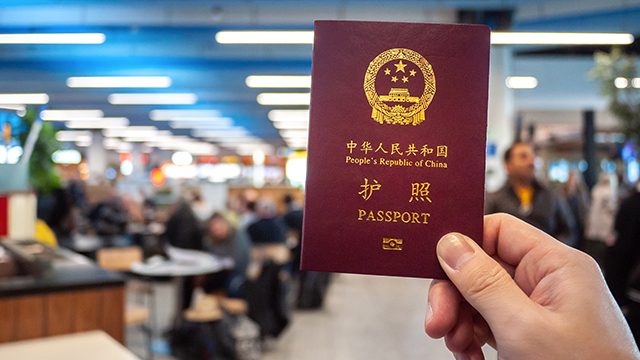SUMMARY
This is AI generated summarization, which may have errors. For context, always refer to the full article.

MANILA, Philippines (UPDATED) – President Rodrigo Duterte has agreed to end the implementation of a 7-year policy of the Philippine government not to stamp Philippine visas on Chinese passports in protest of the image of the 9-dash Line featured on their pages.
Duterte made this decision on Monday, August 5, during a Cabinet meeting in Malacañang.
Foreign Secretary Teodoro Locsin Jr had proposed stamping the Philippine visa on passports of Chinese nationals who wish to enter the country instead of the practice of “placing it on a piece of paper,” Presidential Spokesman Salvador Panelo said in a statement on Tuesday morning.
“This was approved by the President,” he said.
Locsin and Malacañang later clarified in separate statements that the Philippines would still assert its rights over the West Philippine Sea as the stamp to be used on Chinese passports would bear the image of the Philippine map with its entire Exclusive Economic Zone (EEZ).
In 2012, the administration of Benigno Aquino III introduced the policy to stamp visas on the application forms of visiting Chinese instead of their passports to protest the image of Beijing’s 9-dash Line featured in its e-passports.
That year, China issued new e-passports with this image which drove the Philippine government to issue a verbal note to the Chinese Embassy in Manila opposing the move.
The Aquino government saw the inclusion of the image as an affront to Philippine sovereign rights since China uses the 9-dash line to claim virtually the entire South China Sea, including the West Philippine Sea which is part of the Philippines’ EEZ.
This e-passports continue to be in use today, according to a diplomatic source.
The 2016 Hague ruling eventually invalidated the 9-dash line and affirmed Philippine rights over the West Philippine Sea. (READ: The Philippines loses to China 3 years after Hague ruling)
“The Philippines strongly protests the inclusion of the 9-Dash Line in the e-passport as such image covers an area clearly part of the Philippines’ territory and maritime domain,” the Philippines’ November 2012 verbal note had said.
Duterte made the decision less than a week after the Philippine government filed a diplomatic protest against China over the presence of Chinese vessels near Pag-asa Island in the West Philippine Sea (South China Sea) – which China is claiming under its 9-dash line principle. (READ: [ANALYSIS] Duterte’s weak grasp of the maritime case in the South China Sea)
The Philippine government filed a case before the United Nations-backed Permanent Court of Arbitration to settle the maritime dispute with China on January 22, 2013. The PCA announced the Philippines the victor in the case on July 12, 2016, over a week after Duterte became president. The victory is not recognized by Beijing and had yet to be enforced by the Duterte administration. (TIMELINE: The Philippines-China maritime dispute)
Duterte’s presidency started a new chapter in Philippines-China relations. The new president took on a friendlier approach, saying he would shelve the Hague ruling for now so that the Philippines could reap economic rewards of warm ties with the Asian giant,
Critics have said this came at the cost of the Philippines’ rights in the West Philippine Sea and valuable natural resources there.
During the Duterte administration, Chinese vessels have been swarming Pag-asa Island and harassing Filipino fishermen and security forces while Beijing continues its military build-up in artificial islands located in Philippine waters.
Malacañang said on Tuesday that Duterte planned to take up the Hague ruling, the Recto Bank incident, as well as other bilateral issues with Chinese President Xi Jinping on his visit to China this month. – Rappler.com
Add a comment
How does this make you feel?
There are no comments yet. Add your comment to start the conversation.